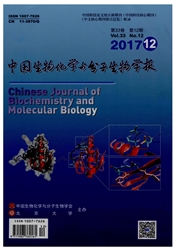

 中文摘要:
中文摘要:
JunD是一种属于多功能激活剂蛋白-1(activating protein-1,AP-1)家族的转录因子,可以激活或抑制多种靶基因的表达.在生长发育过程中,在各种细胞类型中都呈现出组成性表达.近20年的临床数据及分子生物学研究表明,JunD蛋白的功能受多个复杂过程调控,包括转录控制、转录后调节、蛋白质翻译后修饰及蛋白-蛋白相互作用等.JunD基因表达的精细调控及JunD蛋白与其它蛋白之间的相互作用可调节细胞增殖、分化和凋亡等过程.JunD蛋白活性异常会导致肿瘤、代谢及病毒类疾病的发生.JunD蛋白的转录激活及抑制受1个复杂调控网络调控,在这个网络调节下,JunD蛋白在细胞的生长调控过程中发挥重要作用.本文就JunD基因表达的调控机制及其与肿瘤之间关系的最新研究进展做一综述.
 英文摘要:
英文摘要:
JunD is a transcription factor that belongs to the family of activating protein-1(AP-1) transcription factors.It can activate or repress a diverse range of target genes,and it is constitutively expressed at high levels in a wide variety of cells during growth and development.During the past two decades,data obtained from clinical studies and molecular studies have suggested that the function of JunD is regulated by a complex network of processes,including transcriptional control,post-transcriptional regulation,post-translational modification and protein-protein interactions.The precise control of JunD expression and interaction between JunD and other proteins enable it modulate cellular functions such as cell proliferation,differentiation and apoptosis.Inappropriate JunD activity may contribute to neoplastic,metabolic and viral diseases.The transcriptional activation and repression of JunD are integrated into a regulatory network,which allows JunD to exert a pivotal role in controlling cellular growth.In this review,we summarized the mechanisms involved in the regulation of JunD expression and the relationships between JunD and tumor uncovered by recent findings.
 同期刊论文项目
同期刊论文项目
 同项目期刊论文
同项目期刊论文
 PTEN suppresses the oncogenic function of AIB1 through decreasing its protein stability via mechanis
PTEN suppresses the oncogenic function of AIB1 through decreasing its protein stability via mechanis FOXK2 Transcription Factor Suppresses ER alpha-positive Breast Cancer Cell Growth Through Down-Regul
FOXK2 Transcription Factor Suppresses ER alpha-positive Breast Cancer Cell Growth Through Down-Regul EGF is required for cardiac differentiation of P19CL6 cells through interaction with GATA-4 in a tim
EGF is required for cardiac differentiation of P19CL6 cells through interaction with GATA-4 in a tim Induction of the CLOCK gene by E2-ERalpha signaling promotes the proliferation of breast cancer cell
Induction of the CLOCK gene by E2-ERalpha signaling promotes the proliferation of breast cancer cell DEC1 regulates breast cancer cell proliferation by stabilizing cyclin E protein and delays the progr
DEC1 regulates breast cancer cell proliferation by stabilizing cyclin E protein and delays the progr Switching of the Triplet Excited State of Rhodamine/Naphthaleneimide Dyads: An Experimental and Theo
Switching of the Triplet Excited State of Rhodamine/Naphthaleneimide Dyads: An Experimental and Theo The relationship between the inflammatory response and cell adhesion on alginate-chitosan-alginate m
The relationship between the inflammatory response and cell adhesion on alginate-chitosan-alginate m Contributory role of five common polymorphisms of RAGE and APE1 genes in lung cancer among Han Chine
Contributory role of five common polymorphisms of RAGE and APE1 genes in lung cancer among Han Chine DACH1 inhibits SNAI1-mediated epithelial-mesenchymal transition and represses breast carcinoma metas
DACH1 inhibits SNAI1-mediated epithelial-mesenchymal transition and represses breast carcinoma metas 期刊信息
期刊信息
